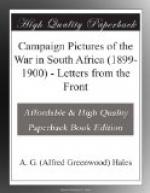The sun climbs higher and higher, until it gleams down straight into the ant-heap; the scorching heat penetrates into the unprotected cells, and enrages the dwellers inside. They swarm out full of fight, like an army lusting for battle. Their home has been ravished of the protection they had raised with half a lifetime of labour, and in their puny way they want vengeance. They find a foe on top, a man ready to their wrath. They crawl into his scorched boots, over his baked feet, guiltless of stockings; they charge up the legs, on which the trousers hang loosely, and as they charge they bite, because they are out for business, not for a picnic. The very stillness of their victim seems to enrage them. The first legion retires at full speed down into the ant-heap again. They have gone for recruits. In a few seconds up they come again, until the very top of the heap is alive with them. They climb one over another in their eagerness to get in their individual moiety of revenge. Down into the veldtschoon, up the bare, hairy legs, over the hips, round the waist, over the lean ribs, along the spine, under the arms, round the neck, over the whole man they go, as the Mongolian hordes will some day go over the Western world. And each one digs his tiny prongs into the smarting, burning, itching poor devil on top of their homestead. He shifts a leg the hundredth part of an inch. The guard on the left gives his bandolier a warning twist, and glances along the long brown barrel that nestles in the hollow of his left hand.
The commandant comes out of the circle of burghers, looks at the victim, sees that the eyes are bloodshot and protruding far beyond the normal position. He is not a hard man, but he knows that the culprit has endangered the lives and liberties of all. “You will remember this,” he says sternly; “you will not again sleep when it is your turn to watch.” “Never, so help me God!” gasps the prisoner. “Stand down, then; you are free.” Quicker than a swallow’s flight is the movement of the liberated man. He drops his rifle with a gasp of relief, tears every stitch of clothing from his body, throws the garments from him, and pelts his veldtschoon after them. Some sympathetic veteran, who has possibly, in earlier wars, been through the ordeal himself, runs up with a drink of blessed water. He does not drink it; he pours it down his burning throat, then sits on the grass, drawing his breath in long, sobbing sighs, all the more terrible because they are tearless. From head to heel he is covered with tiny red marks, just like a schoolboy who has had the measles; in three days there will not be a mark on him, but he won’t forget them, all the same, not in thirty-three years, or three hundred and thirty-three, if he happens to have a memory of any kind at that period.




